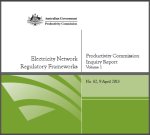The Productivity Commission’s Electricity Network Regulatory Frameworks final inquiry report laments that not enough small scale solar power systems have been installed facing west.
The report states average electricity prices across Australia have risen by 70 per cent in real terms from June 2007 to December 2012 – but doesn’t point the finger at solar. It acknowledges what has been known for years; network costs in most states are the main culprit and offers a series of recommendations for addressing the issues.
But on the topic of distributed generation, particularly home solar power; it arrives at some conclusions that are sure to generate debate.
The Commission says uptake of solar panels to date has produced minimal if any network savings. It says the problem is due to the structure of feed in tariffs that do not encourage householders to orient solar panel systems to the west to maximise generation in periods of peak demand.
It also identifies the geographical deployment of solar as an issue, in that uptake should be maximised in those parts of the system subject to the greatest constraints, “which again has not yet happened.”
The Commission’s recommendations include the phasing out “as quickly as practicable” of the subsidisation for solar panel systems via premium feed in tariffs and also the small-scale component of the Renewable Energy Target Scheme.
It recommends governments should change feed in tariff arrangements for new connections so rates reflect the market wholesale prices at the time the power is produced and the (net) value to network businesses with regard to load reduction on equipment at critical peak periods.
The full Electricity Network Regulatory Frameworks inquiry report can be accessed here. An overview of the Commission’s findings on residential PV-based generation can be viewed in this section (PDF).












































